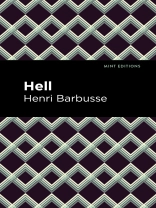Hell (1908) is a novel by Henri Barbusse. Immensely popular upon its publication in France, Hell earned Barbusse a reputation as a leading realist whose existential preoccupations predate the novels and plays of Samuel Beckett, Albert Camus, and Jean-Paul Sartre by several decades. His portrait of ennui, isolation, and urban life remains both stylistically and thematically fresh over a century after it appeared in print. “A whole world of human beings had passed here like smoke, leaving nothing white but the window. And I? I am a man like every other man, just as that evening was like every other evening.” In this claustrophobic, lyric novel, an unnamed narrator moves into a rundown apartment in Paris. There, he grows increasingly isolated from the world outside, turning instead to the lives of his many neighbors. Through the thin walls, which contain a hidden peephole, he listens and watches as strangers conduct the secret dramas of their daily lives. Witnessing acts of adultery, lesbianism, incest, theft, and abuse, he grows increasingly dependent on the adrenaline rush of voyeurism, withdrawing further and further from the life of the bustling city. This edition of Henri Barbusse’s Hell is a classic work of French literature reimagined for modern readers.
Since our inception in 2020, Mint Editions has kept sustainability and innovation at the forefront of our mission. Each and every Mint Edition title gets a fresh, professionally typeset manuscript and a dazzling new cover, all while maintaining the integrity of the original book.
With thousands of titles in our collection, we aim to spotlight diverse public domain works to help them find modern audiences. Mint Editions celebrates a breadth of literary works, curated from both canonical and overlooked classics from writers around the globe.
关于作者
Henri Barbusse (1873-1935) was a novelist and member of the French Communist Party. Born in Asnières-sur-Seine, he moved to Paris at 16. There, he published his first book of poems, Pleureuses (1895) and embarked on a career as a novelist and biographer. In 1914, at the age of 41, Barbusse enlisted in the French Army to serve in the First World War, for which he would earn the Croix de guerre. His novel Under Fire (1916) was inspired by his experiences in the war, which scarred him and influenced his decision to become a pacifist. In 1918, he moved to Moscow, where he joined the Bolshevik Party and married a Russian woman. Barbusse briefly returned to France, joining the French Communist Party in 1923, before moving back to Russia to work as a writer whose purpose was to support Bolshevism, illuminate the dangers of capitalism, and inspire revolutionary movements worldwide. In addition to his writing, Barbusse took part in the World Committee Against War and Fascism and the International Youth Congress, as well as worked as an editor for Monde, Progrès Civique, and L’Humanité. His final work was a biography of Joseph Stalin, which appeared in 1936 after his death from pneumonia in Moscow. Buried in Paris, his funeral was attended by a half million mourners. Among his many friends and colleagues were Egon Kisch, Albert Einstein, and Romain Rolland.












